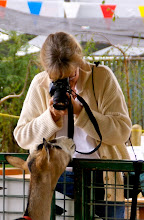I learned as a young lawyer to consider risk when making plans. There are two parts to risk: the odds that something will happen and how disastrous that something might turn out to be. A 1% risk may sound small until it's a 1% risk of, oh I don't know, getting gunned down in the next 60 seconds. Then a 1% risk sounds pretty darned high.
I mention this because I'm puzzled about comments some friends have made recently on Facebook. On days when the weather is unseasonably cold here in the Pacific Northwest, I see gleeful postings like "Must be global warming. NOT!" or "Global warming, WHAT global warming?"
The actual problem is global climate change and not simply global warming, and weather that's weirdly cold can be evidence that the climate is indeed changing. This winter Rush Limbaugh announced that climate change was a hoax because the weather in Washington, D.C. was cold, all the while failing to notice that the Vancouver Olympics had to truck in snow and Seattle had its warmest January on record. The problem is the larger trends over time in multiple locations around the globe, not just what we see when out the kitchen window. So at a superficial level what troubles me about these blithe triumphalists is that they appear to getting their scientific information from featherbrained bumper stickers and bad sermons.
But at a deeper level what troubles me is the apparent absence of any sort of risk analysis. As Bill McKibben recites in his wonderful new book "Eaarth: Making a Life on a Tough New Planet" (and no that's not a typo), in October 2007 the Arctic ice cap was 1.1 million square miles smaller than it had ever been in recorded history. In 2009 scientists saw the first tundra fires ever. The tropics are moving north and south, pushing the arid subtopics ahead of them, causing droughts for millions of people. As a result of droughts, worldwide wheat, corn, and barley yields are down by 40 million tons a year.
And so on.
And so on.
Given these sorts of facts, I wonder what sort of risk analysis is going on in my friends' heads. Many of them have children and grandchildren. Assume for the sake of argument that the facts Bill McKibben lists are not actual facts but merely "might be" facts. Assume furthermore that there is only a 1% chance that these "might be" facts are true. (They actually ARE true but we're just playing with a hypothetical here.) It seems to me that a 1% chance of ruining the one and only planet we've been given is a colossally unacceptable risk.
So I wonder if for some people critical thinking and risk analysis might be entirely beside the point. Is it possible that folks start from the premise that they don't WANT to change a damn thing and they therefore construct a narrative in their own heads so they don't HAVE to change a damn thing? Risk analysis? WHAT risk analysis? Don't need no stinking risk analysis. I want my S.U.V!!! I want all my cheap plastic crap! I want strawberries in January! And to hell with everyone else....
On a lighter note, the picture up above is of a series of stair-stepped beaver dams near Mt. St. Helens. We counted five big dams and two little dams. Three vultures circled up above, checking to see if we were still moving (we were), followed by two ravens checking to see if we had bologna sandwiches to share (we didn't).
Today's front yard critter count
Deer: 0
Raccoons: 0
Squirrels: 1
A FRESH START!
4 years ago


Right on Ann. I like your risk analysis explanation of the planet earth. I guess we are seeing the failure to consider the 1% risk (probably was higher) in the Gulf of Mexico. We haven't seen anything yet once the fallout is accurately calculated. That oil will come around the globe. Keep up your wonderful blogs.
ReplyDelete